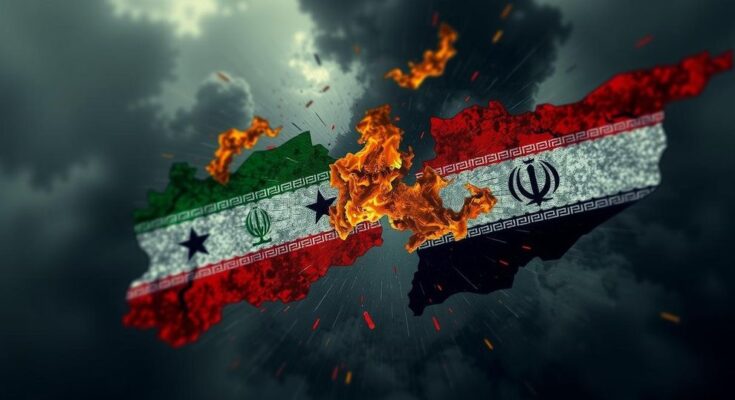The Syrian conflict is key for Russia and Iran as both nations back President Assad to maintain regional influence. Russia’s military bases in Syria grant access to the Mediterranean, crucial for its geopolitical ambitions. Iran uses Syria to support its proxy networks, particularly Hezbollah. Recent escalations by rebel forces highlight the vulnerabilities of their alliance with Assad, which could reshape regional power dynamics.
The Syrian conflict remains critically significant for both Russia and Iran, primarily due to their unwavering support for President Bashar Assad. Russia’s military engagement, particularly its airstrikes against Syrian rebels, underscores its strategic interest in maintaining two vital military bases in Syria, which provide essential access to the Mediterranean Sea. Furthermore, this access enhances Russia’s capabilities for regional influence and military operations across the Middle East and Africa, especially amid the ongoing geopolitical rivalry with the United States.
For Iran, Syria serves as a crucial link in its network of regional proxies, facilitating its support for groups such as Hezbollah. The Iranian regime has established numerous military facilities within Syria to fortify its position and ensure a supply route for weaponry. Recent Israeli operations against Hezbollah challenge this access, prompting Tehran to intensify its role in the Syrian conflict to reclaim lost influence.
As the latest offensive by Syrian rebels escalates, the implications for both Moscow and Tehran are profound. The potential fall of strategic cities like Aleppo reflects on the vulnerability of their alliance with Assad and indicates a significant setback in their regional agenda.
This longstanding partnership traces back to the Cold War, evolving substantially under Putin and Assad’s leadership. Direct Russian military intervention in Syria began in 2015, and since then, Russia has bolstered its presence, claiming considerable operational experience gained during the ongoing conflict. However, recent developments in Ukraine have necessitated a shift in focus for Russia, raising concerns about the sustainability of its commitment to Syria.
Simultaneously, Iran’s historical ties with Syria have been fortified since the Iranian revolution of 1979. Despite recent escalations with Israel diverting Iran’s attention, Syria remains a pillar for Tehran’s regional strategy as it contends with various challenges concerning its proxy relationships.
The Syrian conflict has evolved into a complex battleground for geopolitical interests, particularly for nations like Russia and Iran. Both countries have invested significantly in supporting President Bashar Assad’s regime for strategic military and political gains. Russia views its presence in Syria as a necessary expansion of its influence in the Middle East, while Iran utilizes Syria to enhance its alliances with militant groups across the region, thereby maintaining its foothold against adversaries like Israel and the US.
In conclusion, the Syrian conflict serves as a vital arena for Russia and Iran to project their influence and secure their respective geopolitical interests. Both nations face significant challenges amid a shifting landscape, where the ongoing conflicts and military operations could determine the future stability of their alliances in the Middle East. The loss of strategic cities to rebel forces could lead to a shift in power dynamics that may diminish their influence in the region.
Original Source: www.businessinsider.com




